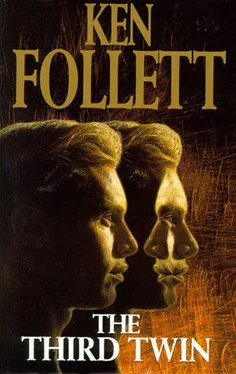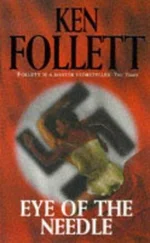Jeannie saw where all this was heading. “Lisa, that may be true, but it doesn’t make the rape your fault, okay? You’re not to blame, not one iota. You were in a train wreck: it could have happened to anyone.”
“You’re right,” Lisa said.
They drove ten miles out of town and pulled off the interstate at a sign marked “Greenwood Penitentiary.” It was an old-fashioned prison, a cluster of gray stone buildings surrounded by high walls with razor wire. They left the car in the shade of a tree in the visitors’ parking lot. Jeannie put her jacket back on but left off her panty hose.
“Are you ready for this?” Jeannie said. “Dennis is going to look just like the guy who raped you, unless my methodology is all wrong.”
Lisa nodded grimly. “I’m ready.”
The main gate opened to let out a delivery truck, and they walked in unchallenged. Security was not tight, Jeannie concluded, despite the razor wire. They were expected. A guard checked their identification and escorted them across a baking-hot courtyard where a handful of young black men in prison fatigues were throwing a basketball.
The administration building was air-conditioned. They were shown into the office of the warden, John Temoigne. He wore a short-sleeved shirt and a tie, and there were cigar butts in his ashtray. Jeannie shook his hand. “I’m Dr. Jean Ferrami from Jones Falls University.”
“How are you, Jean?”
Temoigne was obviously the type of man who found it hard to call a woman by her surname. Jeannie deliberately did not tell him Lisa’s first name. “And this is my assistant, Ms. Hoxton.”
“Hi, honey.”
“I explained our work when I wrote to you, Warden, but if you have any further questions I’d be glad to answer them.” Jeannie had to say that, even though she was itching to get a look at Dennis Pinker.
“You need to understand that Pinker is a violent and dangerous man,” said Temoigne. “Do you know the details of his crime?”
“I believe he attempted to sexually assault a woman in a movie theater, and killed her when she tried to fight him off.”
“You’re close. It was at the old Eldorado movie theater down in Greensburg. They were all watching some horror movie. Pinker got into the basement and turned off the electric power. Then, while everyone was panicking in the dark, he ran around feeling girls up.”
Jeannie exchanged a startled look with Lisa. It was so similar to what had happened at JFU on Sunday. A diversion had created confusion and panic, and given the perpetrator his opportunity. And there was a similar hint of adolescent fantasy about the two scenarios: feeling up all the girls in the darkened theater, and seeing the women running naked out of the changing room, if Steve Logan was Dennis’s identical twin, it seemed they had committed very similar crimes.
Temoigne went on: “One woman unwisely tried to resist him, and he strangled her.”
Jeannie bridled. “If he had felt you up, Warden, would you have unwisely tried to resist him?”
“I ain’t a girl,” Temoigne said with the air of one who plays a winning card.
Lisa tactfully intervened. “We should get started, Dr. Ferrami—we have a lot of work to do.”
“You’re right.”
Temoigne said: “Normally you would interview the prisoner through a grille. You’ve specially asked to be in the same room with him, and I have orders from above to let you. All the same I urge you to think again. He is a violent and dangerous criminal.”
Jeannie felt a tremor of anxiety, but she stayed outwardly cool. “There will be an armed guard in the room all the time we’re with Dennis.”
“There sure will. But I’d be more comfortable if there was a steel mesh separating you from the prisoner.” He gave a sickly grin. “A man doesn’t even have to be a psychopath to suffer temptation with two such attractive young girls.”
Jeannie stood up abruptly. “I appreciate your concern, Warden, I really do. But we have to carry out certain procedures, such as taking a blood sample, photographing the subject, and so on, which can’t be done through bars. Furthermore, parts of our interview are intimate and we feel it would compromise our results to have such an artificial barrier between us and the subject.”
He shrugged. “Well, I guess you’ll be okay.” He stood up. “I’ll walk you along to the cell block.”
They left the office and crossed a baked-earth yard to a two-story concrete blockhouse. A guard opened an iron gate and let them in. The interior was as hot as the outside. Temoigne said: “Robinson here will take care of you from now on. Anything else you girls need, just holler.”
“Thank you, Warden,” Jeannie said. “We appreciate your cooperation.”
Robinson was a reassuringly tall black man of about thirty. He had a pistol in a buttoned holster and an intimidating-looking nightstick. He showed them into a small interview room with a table and half a dozen chairs in a stack. There was an ashtray on the table and a water cooler in the corner; otherwise the room was bare. The floor was tiled in gray plastic and the walls were painted a similar shade. There was no window.
Robinson said: “Pinker will be here in a minute.” He helped Jeannie and Lisa arrange the table and chairs. Then they sat down.
A moment later the door opened.
16
BERRINGTON JONES MET WITH JIM PROUST AND PRESTON Barck at the Monocle, a restaurant close to the Senate office building in Washington. It was a power lunch venue, full of people they knew: congressmen, political consultants, journalists, aides. Berrington had decided there was no point in trying to be discreet. They were too well known, especially Senator Proust with his bald head and big nose. If they had met in an obscure location, some reporter would have spotted them and written a gossip item asking why they were holding secret meetings. Better to go where thirty people would recognize them and assume they were having a routine discussion about their legitimate mutual interests.
Berrington’s aim was to keep the Landsmann deal on the rails. It had always been a risky venture, and Jeannie Ferrami had made it downright dangerous. But the alternative was to give up their dreams. There would be only one chance to turn America around and put her back on the course of racial integrity. It was not too late, not quite. The vision of a law-abiding, churchgoing, family-oriented white America could be made a reality. But they were all around sixty years of age: they were not going to get another chance after this.
Jim Proust was the big personality, loud and blustering; but although he often annoyed Berrington, he could usually be talked around. Mild-mannered Preston, much more likable, was also stubborn.
Berrington had bad news for them, and he got it out of the way as soon as they had ordered. “Jeannie Ferrami is in Richmond today, seeing Dennis Pinker.”
Jim scowled. “Why the hell didn’t you stop her?” His voice was deep and harsh from years of barking orders.
As always, Jim’s overbearing manner irritated Berrington. “What was I supposed to do, tie her down?”
“You’re her boss, aren’t you?”
“It’s a university, Jim, it’s not the fucking army.”
Preston said nervously: “Let’s keep our voices down, fellas.” He wore narrow glasses with a black frame: he had been wearing the same style since 1959, and Berrington had noticed that they were now coming back into fashion. “We knew this might happen sometime. I say we take the initiative, and confess everything right away.”
“Confess?” Jim said incredulously. “Are we supposed to have done something wrong?”
“It’s the way people might see it—”
“Let me remind you that when the CIA produced the report that started all this, ‘New Developments in Soviet Science,’ President Nixon himself said it was the most alarming news to come out of Moscow since the Soviets split the atom.”
Читать дальше












